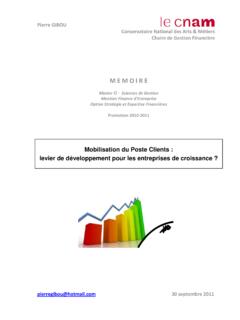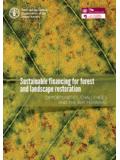Transcription of Strengthening Tax Systems to Mobilise Domestic Resources ...
1 Strengthening Tax Systems to Mobilise Domestic Resources in the Post-2015 Development Agenda Strengthening Domestic tax collection will be essential to provide governments with sustainable revenue sources to finance the post-2015 Sustainable Development Goals and invest in development, relieve poverty and deliver public services. Effective taxation provides a reliable and sustainable source of revenues that is needed to promote growth and offers an antidote to aid dependence in developing countries. The benefits of taxation extend beyond revenue generation as it can increase state capacity, accountability and responsiveness by providing a platform to governments to engage with their citizens.
2 Thus, it strengthens the fiscal contract between the state and its citizens. How revenue gets collected is as important as how much gets collected. The objective of tax reform should also be to establish a tax system that is efficient, growth-oriented and equitable. Political commitment to reform is crucial for its success. Experiences of successful reform underline the importance of local leadership, locally developed solutions, and sensitivity of providers of development assistance to local political and social context. For developing countries it is even more difficult than for developed countries to deal with weak tax administrations, corruption and poor governance, a low willingness to pay taxes and extensive informality.
3 Globalisation poses new tax challenges and opportunities. The OECD launched a major initiative, the Action Plan on Base Erosion and Profit Shifting, to revamp the existing international tax standards to address profit shifting by multinational enterprises and stands by developing countries to ensure they share in the benefits. Curbing illicit financial flows requires concerted action, through a whole-of-government approach, in both OECD and non-OECD countries. In July 2014 the OECD endorsed a proposal for a new single global standard for Automatic Exchange of Information to fight against tax evasion and illicit financial flows.
4 The OECD stands ready, through its Tax and Development Programme, to advise and support the international development community in improving the enabling environment for developing countries to collect taxes fairly and effectively. With only an estimated (USD million) of total official development assistance (ODA) dedicated to tax matters in 2012, the international development community needs to do more to improve Domestic capacity for tax Systems development in developing countries. Cost (ODA) to benefit (additional revenue yielded) ratios of USD 1: USD thousands are not uncommon for tax reform support AND POST-2015 REFLECTIONS MOBILISING Domestic RESOURCESE lement 11, PAPER 2 Strengthening TAX Systems TO Mobilise Domestic Resources IN THE POST-2015 DEVELOPMENT AGENDA2 Why focus on taxation as a means to Mobilise Domestic Resources in the post-2015 agenda?
5 The post-2015 Sustainable Development Goals (SDGs) require adequate funding to be credible and attainable. In addition to official development aid (ODA), many more Resources need to be mobilised (see DCR 2014), one of the most important being Domestic tax revenues. In 2008 the Doha Declaration on Financing for Developmenti confirmed the need to strengthen efforts to enhance tax collection, investment and other private flows, with a view to supporting sustainable development and inclusive growth. Yet low-income countries Mobilise on average only 13% of their GDP, below the minimum level of 20% considered by the UN as necessary to achieve the current Millennium Development Goals (UNDP, 2010).
6 Taxation provides governments with the funds needed to invest in development, relieve poverty and deliver public services. Effective taxation provides a reliable and sustainable source of revenues that is needed to promote sustainable growth and offers an antidote to dependence of developing countries on external funding. Strengthening Domestic tax Systems is not just a question of raising revenue: it is also about designing a tax system that promotes inclusiveness, encourages good governance, promotes investments and job creation, matches society s views on appropriate income and wealth inequalities and promotes social justice (IMF et al, 2010).
7 Taxation is integral to Strengthening the effective functioning of the state and to the social contract between governments and citizens. By encouraging dialogue between states and their citizens, the taxation process is central to more effective and accountable states. Reforms which begin in tax administrations may spread to other parts of the public sector (OECD, 2008a).The UN Open Working Group (OWG) on Sustainable Development Goals considers Strengthening Domestic resource mobilisation through taxation as a key means of implementation. In its Outcome Document the OWG calls on the donor community to step up its international support to strengthen Domestic resource mobilisation, including through international support to developing countries to improve Domestic capacity for tax and other revenue collection (OWG, 2014).
8 Tax revenues already make up a significant proportion of developing countries GDP, but have the potential to contribute much more if they are mobilised and better aid to strengthen tax Systems is required in the post-2015 frameworkWhilst Domestic political leadership is the primary driver of capacity development in tax matters, partnerships with international assistance providers can play an important role in Strengthening tax collection. Relatively modest international support for a developing country s tax authority can have a dramatic impact on its ability to raise revenues. Advice from the OECD s Tax and Development Programme on Transfer Pricingii delivered institutional changes and an additional USD 100 million in collected tax revenues in developing countriesiii.
9 Cost (ODA) to benefit (additional revenue yielded) ratios of USD 1: USD thousands are not uncommon for tax reforms support programmes:1. In Colombia, revenues increased from USD in 2011 to USD in 2012 to approximately USD 10M in 2013 and is currently at approximately USD 30M for 2014 and expected to reach USD 50M by the end of 2014 as a result of Strengthening their transfer pricing In Kenya, revenue collection increased from USD 52M for year ended 30 June 2012 to USD 85M for year ended 30 June 2013 and forecasted to be in excess of USD 100M for year ended 30 June 2014 as a result of targeted transfer pricing In Vietnam, support to the tax administration strengthened its capacity to enforce its transfer pricing rules.
10 Two recent audits of Multinational Enterprises resulted in increased tax paid of USD and USD Estimates based on OECD data suggests that currently around of Official Development Assistance (excluding the IMF) goes to support the development of tax Systems in developing countries (Figure 1). This is despite some strong evidence to suggest that international assistance can be a powerful catalyst and lever for Domestic resource the evidence of success is compelling, why do tax Systems attract so little international assistance?Figure 1: Official development assistance for tax-related activities, 2004-12 Source: OECD Creditor Reporting system statistics.

















